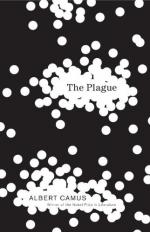|
|
The Plague Topic Tracking: Abstraction
Part 1
Abstraction 1: The narrator's remarks on how people tend to think pestilence is just a bad dream. Dr. Rieux cannot really feel the horror of a hundred million people dead. This indicates that the human tendency is to abstract, or to feel emotionally detached from the reality of the plague and its horrors.
Abstraction 2: The hesitation of Rieux and the others to define the epidemic as the plague shows that they're resisting dealing with the disease as something real. The woman that Rieux sees die in the street on his drive home, however, is very real. When a person violently dies in front of you, it is impossible to remain detached.
Part 2
Abstraction 3: Rambert accuses Dr. Rieux of being too abstract because the doctor won't allow Rambert the real happiness of leaving the town to reunite with his wife. Rambert's accusations make the doctor think that man struggles between feeling concrete happiness and the following abstract rules and beliefs that could stand in the way of this happiness.
Abstraction 4: God is suggested to be abstract, and in times of suffering, people focus on concrete pleasures--sex, good food--to give them solace.
Abstraction 5: The sanitary squads kick the people of the town into doing something tangible to help fight the plague.
Abstraction 6: Dr. Rieux finds that sympathy expressed through words is never adequate--language is always abstract and is often unable to express complicated emotions.
Abstraction 7: Rambert, in his discussion with Dr. Rieux, makes it very clear that he will only live and die for love, never for an idea. Despite this assertion, and because it's taking so long to get out of Oran, he dutifully stays and volunteers for the sanitary squads.
Part 3
Abstraction 8: The townspeople lose hope and are ready to die once those they love fall from memory (become abstract).
Part 4
Abstraction 9: Jacques' death is very concrete, and seeing it changes and/or reinforces the way the witnesses think about abstract thinking.
Abstraction 10: M. Othon, after the death of his son, is motivated to do something tangible to help the plague effort and volunteers at the same quarantine camp from which he was just released.
Part 5
Abstraction 11: When the people return to Oran, it is clear that there will be some happiness for those who are reunited with their loved ones. Happiness, Rieux says, is always less certain when people put their hope in ideas rather than people.




